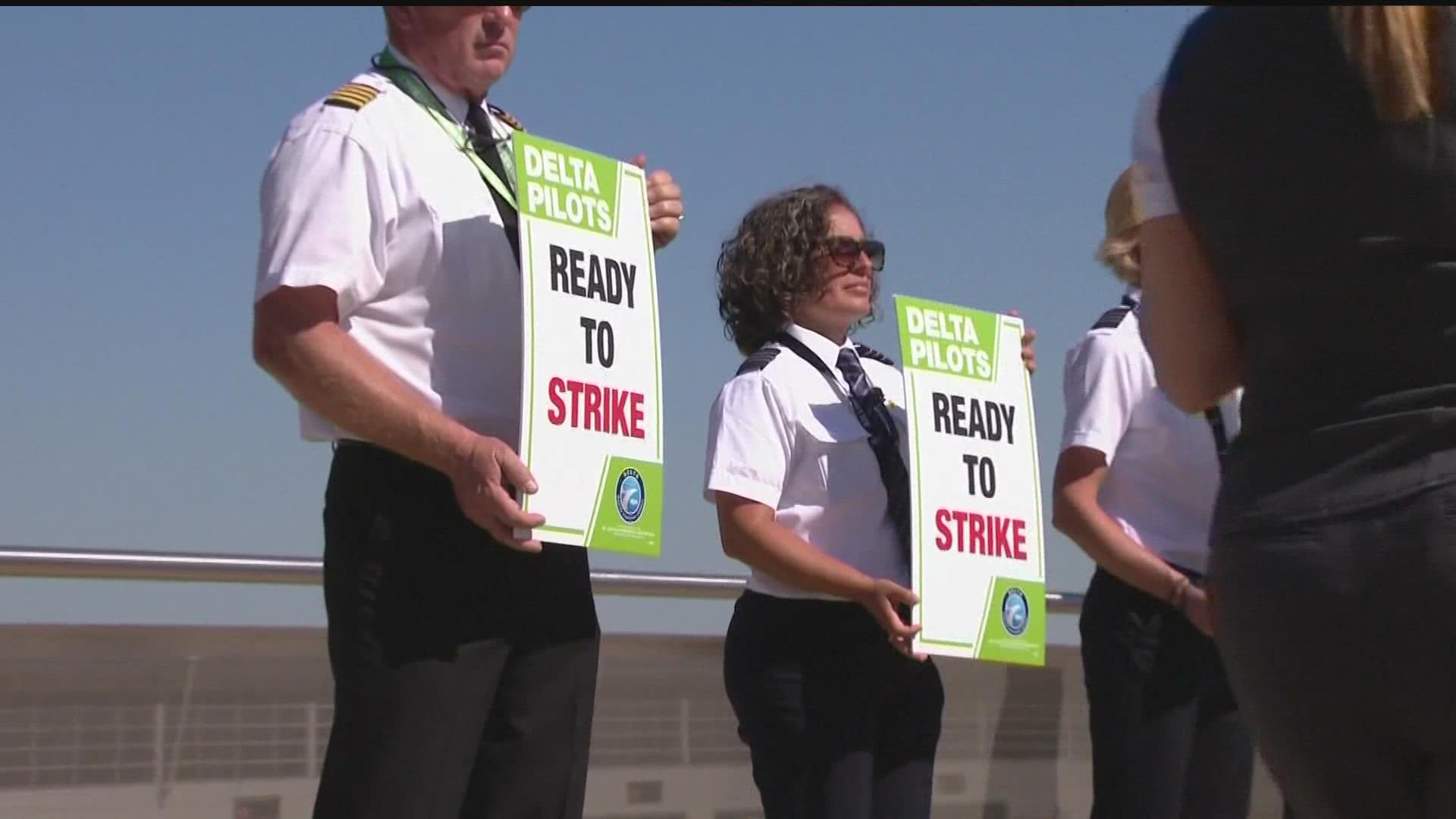MINNEAPOLIS — As holiday travel season approaches, three of the country's largest airlines find themselves in the middle of a crisis.
American Airlines pilots remain in contract negotiations while United Airlines pilots rejected a tentative contract agreement Wednesday, just two days after 15,000 Delta pilots authorized a potential strike.
"The airline pilots have gone through a lot with COVID and certainly they have legitimate grievances," said University of St. Thomas law professor Charles Reid.
Negotiations for better pay and benefits have been in the works since January for Delta pilots, after a two-year suspension due to the pandemic.
But as Professor Reid explains, this strike authorization must first go through a legal process, involving the National Mediation Board.
"The National Mediation Board can take months, and sometimes it can take a year or more," explained Professor Reid. He went on to say, "there's a strong public policy involved in making sure that airlines and railroads run smoothly, we don't want disruptions to freight, commerce, we don't want disruptions to passenger service."
So what does this mean for holiday travel?
"This is more of a spring break worry rather than a Thanksgiving or a Christmas holiday worry," said Professor John Budd with the Carlson School of Management at the University of Minnesota. "After the mediator finally releases the parties, the mediator thinks they’ve exhausted all the channels to possibly reach an agreement without a strike then there’s a 30-day cooling off period.”
Officials with Delta say they are confident an agreement will be reached that is fair and equitable, just as they have with negotiations in the past.
"There's a lot more restrictions which make it much more difficult to go on strike again because the goal is not only to allow workers to engage in collective bargaining, but to protect the economy," said Professor Budd.
The Airline Pilots Association sent KARE 11 the following statements regarding United and Delta:
United Pilots Resoundingly Reject Tentative Agreement
Today, the United pilots, represented by the Air Line Pilots Association, Int’l (ALPA), voted overwhelmingly to reject the tentative agreement (TA) that was presented to the pilot group earlier this summer. A record 9,980 United pilots participated, with 94 percent voting against the proposal. This TA fell short of the industry-leading contract United pilots have earned and deserve after leading the airline through the pandemic and back to profitability.
“I want to thank the United pilots for their outstanding participation at this important moment in our history,” said United Master Executive Council chair Capt. Mike Hamilton. “By the Company’s own admission, this agreement missed the mark. That’s why both parties agreed to reengage at the bargaining table for a new, improved agreement. It is vital United management recognizes that an industry-leading contract is required to hire, train, and retain the best pilots in the world for the United Next growth plan to succeed.”
Unfortunately, management has now taken a wait-and-see approach to negotiations instead of leading the industry forward. In the face of continued management delays, the United pilots will immediately begin a series of informational picketing events to bring the company back to the bargaining table to finalize an agreement. United pilots are unified and committed to reaching a comprehensive agreement that fully recognizes their contributions to the success of the airline.
Delta Pilots Vote Overwhelmingly to Authorize a Strike
Delta Air Lines pilots, represented by the Air Line Pilots Association, Int’l (ALPA), voted overwhelmingly in favor of a strike-authorization ballot. With over 96 percent of members participating, 99 percent of Delta pilots authorized union leaders to call a strike, if necessary, to achieve a new contractual agreement with Delta Air Lines.
The Delta pilots are working under pay rates, contractual provisions, and benefits negotiated in 2016. Negotiations for a new agreement began in April 2019, nine months prior to the amendable date of December 2019. Talks entered mediation in February 2020 and were paused in March 2020 for nearly two years due to the COVID-19 pandemic. Mediated talks resumed in January 2022.
“Today, Delta’s nearly 15,000 pilots sent a clear message to management that we are willing to go the distance to secure a contract that reflects the value we bring to Delta Air Lines as frontline leaders and long-term stakeholders,” said Capt. Jason Ambrosi, chair of the Delta Master Executive Council. “Delta has rebounded from the pandemic and is poised to be stronger than ever, posting record revenues for the third quarter. Meanwhile, our negotiations have dragged on for too long. Our goal is to reach an agreement, not to strike. The ball is in management’s court. It’s time for the Company to get serious at the bargaining table and invest in the Delta pilots.”
Before a strike can take place, the National Mediation Board must first decide that additional mediation efforts would not be productive and offer the parties an opportunity to arbitrate the contract dispute. If either side declines the arbitration, both parties enter a 30-day “cooling off” period, after which pilots and management can engage in self-help—a strike by the union or a lockout by management.
Watch more local news:
Watch the latest local news from the Twin Cities in our YouTube playlist:

